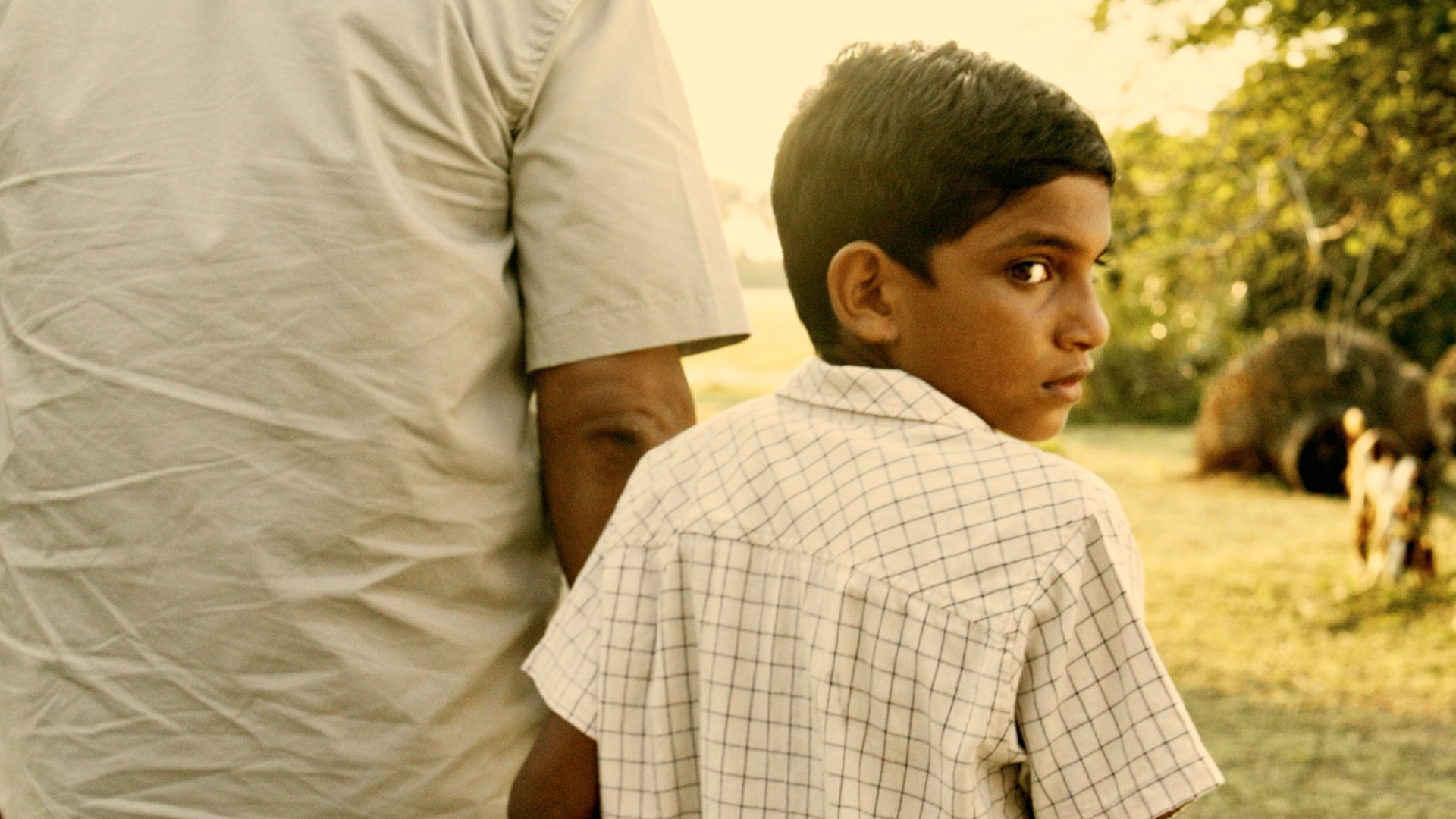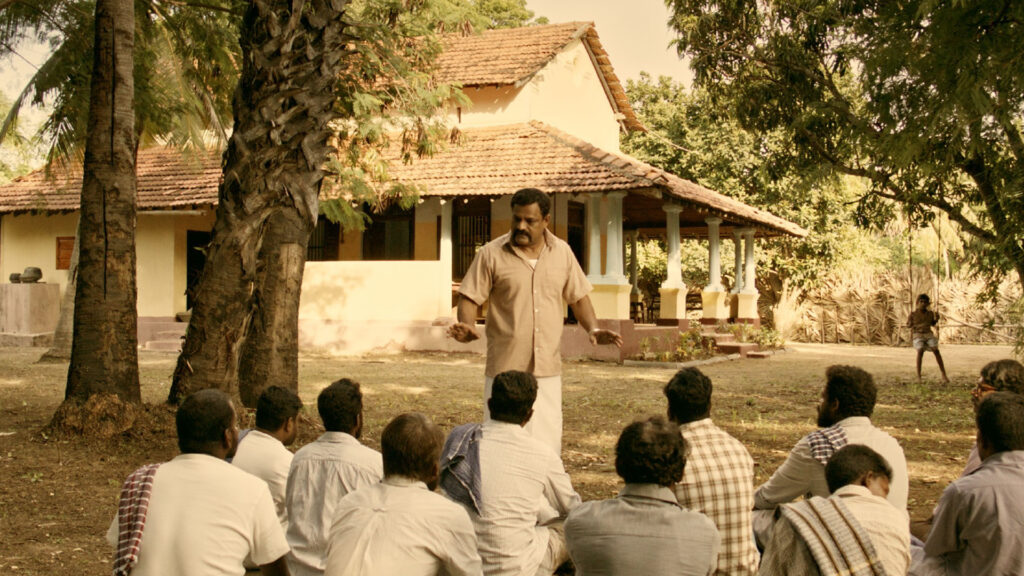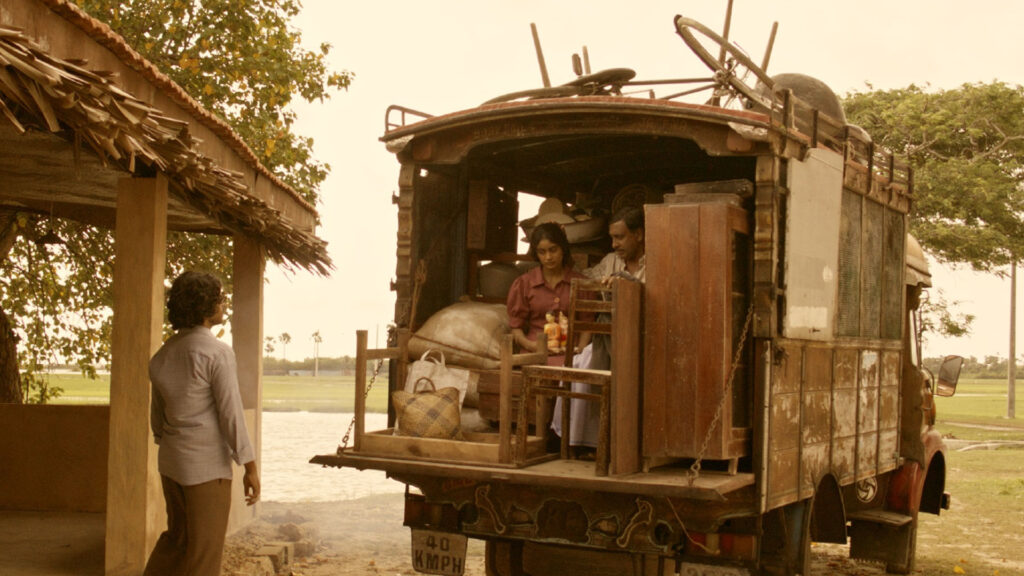Glimpse of “Neeru Pootha Neruppu”
2009 May 19th, on the day after the civil war was seized, Alfred Durreiappa s’ soul spirit comes to live and walks slowly in a destructed home destroyed by the war. Durreiappa s’ gunshot wounds are yet bloody and raw. He walks slowly and touches the scared walls with pain and tears. He expresses a mind full of guilt, of the deeds incurred during his period. Durreiappa gradually comes towards the front of the house, and gaze across the destruction with tears, and silently question himself in grief of war which he never witnessed.
The time flows bac towards the past and “Neeru Pootha Neruppu” cinematic master piece unwraps its’ story flow with a disturbing incident which took place in a rural suburb in Jaffna during 1960.

Prabha a Seven years old village boy walks along with his father Sekaran, heading back home from the market place. Meanwhile they proceed along the gravel road passing the Hindu temple, the boy sees two police constables who had captured and beats an Aiyar (a temple priest), and crowd who had come for the prayers have gathered to witness the chaos and they struggle to seize the attack. Not knowing the exact reasons for the aggravated incident, the boy walks along with curiosity and fear. With a scattered mind full of confusion, the boy walks further and questions the father, asking the reason for such violence. Having some kind of understanding about the situation, Sekaran continues walking without any mention. But the boy continuously insists for an answer and the father is compelled to reply with his visionary explanation, “From the past it has been a common practice that with or without a reason the majority always beats the minority”. Sekaran s’ deep and heavy answer makes the boy even more confused and both head home silently.
incident which he saw near the Hindu Kovil. The mother finds a simple way to explain him the meaning of majority and minority and the meaning of being oppressed. This incident becomes Prabha s’ first teaching about life of being a member of a minority community among the majority in Island. Sekaran is a middle-aged farmer and an entrepreneur, as well as father to his one and only Son Prabha, and husband to a simple traditional house wife Vasuki. Sekaran is an unbiased intellectual social worker and a political activist in the village. He dedicates his time and efforts to groom and flourish the minds of the common people and the young generation, to become uncage from political extremism and develop unbiased thinking. Sekaran s’ key motif is to free the minds of people from political biasness and slavery. He gathers people and youth to preach and teach on wise thinking and pursue the public towards widening mindset against political extremism.
Even though Prabha as a child being unable to understand the deep meanings of his fathers’ social talk sessions, he continues to listen to Sekaran s’ preaching and teaching with a passion to understand his father effort. As a traditional and conventional mother, Vasuki strictly opposes and shows her anger against Prabha s’ involvement in Sekaran s’ social preaching and activities. Over the decades meanwhile Sekaran s’ social activities have gradually been accepted by the public with good will, eventually it has turned to become a threat and a menace to rising political groups, clangs and area leaders. Therefore, they look in to various ways and means to silence down Sekaran. Then with a treacherous conduct they execute a traumatic method to make Sekaran s’ voice silence, by the hand of Sinhalese goons.

Gune a bakery owner from Matara come to Jaffna along with his mother and one and only daughter Pramila, two and half decades ago after the demise of his wife at a young age. They had settled down in the same village where Prabha lived. Gune owned a bakery in the village named “Matara Bakery”. Ever since they settled the family had a very calm quite lifestyle among the Tamil village community. Throughout the decades Jaffna eventually became their hometown with a friendly and homely environment. Since childhood Prabha and Pramila were close friends despite cast creed religion and language differences. Meanwhile the political and social background remained as fire beneath ash, Prabha and Pramila grew in to their youth, and entangled in a love relationship. After few years Pramila s’ Grandmother passed away in Jaffna.
After experiencing the tragic demise of Sekaran, and assuming that there would be a threat towards Pramila s’ life , Gune is unhappy of Pramila and Prabha s’ relationship and opposes further continuation. Gune directly request both to refrain from meeting and strictly advise to end the relationship, but both continue the love despite Gune s’ advice. Foreseeing the danger that could affect the young lives, Gune turns towards a friend who serves as a police officer in the area and wanted him to advice the boy to stop the relationship. The Police officer takes this in a different mean and overreacts, with an extreme attitude. Later Prabha was forcefully brought down to the Police station and the officers beat him heavily. This incident creates a turbulence in the village and turns into an unexpected social uprise. Seeing the suffocation of Prabha, his Tamil clang members also reacts with rage towards Gune and Pramila.
The community friendly environment gradually turns in to flames of anger and hatred. Meanwhile the political leaders who influence Prabha force him to bring Pramila into their wing. But eventually being unable to handle the conflicts, Gune decides to backoff and close down the bakery and leave Jaffna. Pramila is forced to leave away from Prabhas life for good and they come to an edge of the road to depart with pain and in tears. For the one last time they meet at the same place where they use to meet during their childhood. And on the next day Gune and Pramila pack all their belongings and leave Jaffna in tears, while Prabha watches with a broken and a frozen heart.

Prabha as an innocent victim of social oppression, sandwiched between evilness of ruthless political goons that caused Sekaran s’ tragic departure and further pushed towards an inevitable breakup of love, molds him into become a numbed man in solitude. Vasuki while burning alive with the traumatic pain as a widowed single mother, faces many hardships and pain to bring up Prabha. Growing with tormenting childhood experiences and losing the dream life with Pramila gradually makes Prabha, rage into flames of revenge. Prabha s’ pain which turned into a flaming wildfire through time, leads him in a path of extremism far away from his fathers’ vision and expectation. Vasuki rises against Prabha s’ conduct in political extremism and unveils an untold story in life, which Prabha never endured before. This untold story of his own self, turns Prabha s’ life upside down creating immense turbulence in mind.
This unprecedented revelation of Vasuki makes Prabha rewinds his past memories to realize the unrealized. She unwraps the hidden periphery with the intention of pulling back Prabha from the wrong path that he has walked along with the influence of grave extremist political vision. But with this revelation Prabha diverts his focus towards a totally different path seeking revenge. Seeing that Prabha leads far from control, Vasuki confines to a life in solitude. Gradually Prabha s’ conduct and actions create turbulence in the entire society and flaming news across the nations. Prabha and his clang s’ next step in revengeful action turns into a nationally and internationally focused circumstance in Island that becomes the being of a new chapter filled with tragic and social turbulence.
At the end, Alfred Durreiappa s’ soul spirit, yet continues to gaze at the unsee tide of terror. And meanwhile, what would happen to Prabha s’ life? Where would the lives of his political clang head? Where dose Vasuki s’ life leads? what tragic situations will rise across the nations? how does the society face the forth coming tides of chaos? where would the future of the nation will lead to? and how does the fire beneath ash would erupt? The answers to these will be unveiled through the flow of “Neeru Pootha Neruppu”.